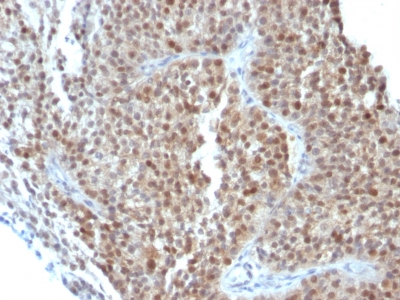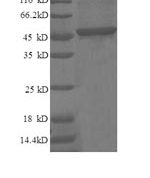Human, Mouse (-), and Rat (-) Anti-p21WAF1 Antibody Product Attributes
Species: Human, Mouse (-), and Rat (-)
Tested Applications: Flow Cytometry, Immunofluorescence, Immunohistochemistry (IHC).
Application Notes: Flow Cytometry (0.5-1ug of antibody/million cells in 0.1ml), Immunofluorescence (1-2ug of antibody/ml), Immunohistochemistry (IHC) (Formalin-fixed) (2-4ug of antibody/ml for 30 minutes at RT)
Clonality: Monoclonal
Anti-p21WAF1 Antibody Clone: CIP1/823 + DCS-60.2
Clone CIP1/823 + DCS-60.2 Host and Isotype: Mouse IgG
Anti-Human, Mouse (-), and Rat (-) p21WAF1 Positive Control Sample: HeLa Cells. Skin, colon, or breast carcinoma.
Cellular Localization of Antibody Nuclear
Buffer and Stabilizer: 10mM PBS with 0.05% BSA & 0.05% azide.
Antibody Concentration: 200ug/ml
Antibody Purification Method:Protein A/G Purified
Immunogen: Recombinant full-length human CDKN1A protein (CIP1/823); Human recombinant p21 protein (DCS-60.2)
Storage Conditions: Store at 2 to 8° C (refrigerate). Stable for 24 months when properly stored.
p21WAF1 Previously Observed Antibody Staining Patterns
Observed Subcellular, Organelle Specific Staining Data:
Anti-CDKN1A antibody staining is expected to be primarily localized to the nuclear bodies and nucleoplasm. There is variability in either the signal strength or the localization of signal in nuclear bodies, and nucleoplasm from cell to cell.Observed Antibody Staining Data By Tissue Type:
Variations in p21WAF1 antibody staining intensity in immunohistochemistry on tissue sections are present across different anatomical locations. An intense signal was observed in Leydig cells in the testis, respiratory epithelial cells in the bronchus, squamous epithelial cells in the cervix, uterine and vagina and trophoblastic cells in the placenta. More moderate antibody staining intensity was present in Leydig cells in the testis, respiratory epithelial cells in the bronchus, squamous epithelial cells in the cervix, uterine and vagina and trophoblastic cells in the placenta. Low, but measureable presence of p21WAF1 could be seen in cells in the glomeruli in kidney, cells in the red pulp in spleen, cells in the tubules in kidney, exocrine glandular cells in the pancreas, germinal center cells in the lymph node, glandular cells in the breast, fallopian tube, gallbladder, parathyroid gland, prostate, seminal vesicle and stomach, hematopoietic cells in the bone marrow, hepatocytes in liver, keratinocytes in skin, non-germinal center cells in the lymph node and tonsil and respiratory epithelial cells in the nasopharynx. We were unable to detect p21WAF1 in other tissues. Disease states, inflammation, and other physiological changes can have a substantial impact on antibody staining patterns. These measurements were all taken in tissues deemed normal or from patients without known disease.Observed Antibody Staining Data By Tissue Disease Status:
Tissues from cancer patients, for instance, have their own distinct pattern of p21WAF1 expression as measured by anti-p21WAF1 antibody immunohistochemical staining. The average level of expression by tumor is summarized in the table below. The variability row represents patient to patient variability in IHC staining.| Sample Type | breast cancer | carcinoid | cervical cancer | colorectal cancer | endometrial cancer | glioma | head and neck cancer | liver cancer | lung cancer | lymphoma | melanoma | ovarian cancer | pancreatic cancer | prostate cancer | renal cancer | skin cancer | stomach cancer | testicular cancer | thyroid cancer | urothelial cancer |
|---|---|---|---|---|---|---|---|---|---|---|---|---|---|---|---|---|---|---|---|---|
| Signal Intensity | - | - | +++ | + | ++ | - | ++ | - | + | - | + | - | + | - | + | ++ | + | - | + | ++ |
| CDKN1A Variability | ++ | ++ | ++ | +++ | ++ | ++ | ++ | + | ++ | + | +++ | ++ | ++ | + | +++ | ++ | ++ | + | ++ | ++ |
Limitations and Warranty
enQuire Bio's p21WAF1 Anti-Human Monoclonal is available for Research Use Only. This antibody is guaranteed to work for a period of two years when properly stored.

.jpg)



-178x178.jpg)

-178x178.jpg)
-178x178.jpg)
-178x178.jpg)
-178x178.jpg)
-178x178.jpg)
There are no reviews yet.